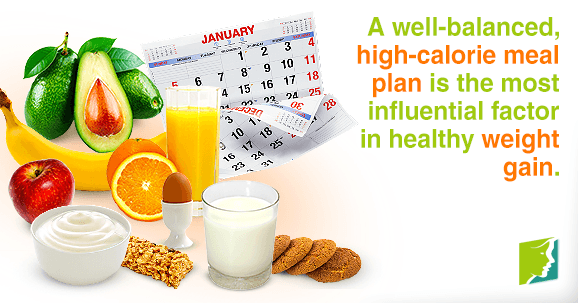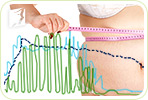Illness, stress, or a change in lifestyle can all cause weight loss to occur; if your weight falls below what's considered normal, you ought to be looking for ways to regain weight - but gorging on junk food is not the answer. Fries, burgers, cakes, and chocolates tend to have high saturated and trans fat content, and these are likely to make you feel sluggish, acquire flabby rather than lean body mass, and experience increased cholesterol and blood sugar levels. Keep reading to discover a meal plan for gaining weight safely.
Day 1
- Breakfast. Two eggs, scrambled with whole milk, served on two slices of whole grain toast. A glass of fresh orange juice.
- Snack. A yogurt with an apple.
- Lunch. Chicken pasta salad. Four squares of dark chocolate.
- Snack. Sliced avocado on crackers.
- Dinner. Stir fried turkey cooked in vegetable oil with tomatoes, onions, and peppers, served on brown rice. A banana for dessert.
- Snack. A glass of whole milk and a cookie.
Day 2
- Breakfast. Porridge with whole milk, chopped almonds, and a handful of raisins. A glass of fresh orange juice.
- Snack. A cereal bar with a banana.
- Lunch. Baked potato with tuna and a matchbox-sized portion of cheese grated on top. A portion of fruit gelatin and a cookie for dessert.
- Snack. An apple and a few squares of dark chocolate.
- Dinner. A portion of grilled chicken with avocado salad and whole grain bread, drizzled with olive oil. Fresh mango topped with yogurt for dessert.
- Snack. A vanilla smoothie made with whole milk.
Day 3
- Breakfast. Whole grain cereal with whole milk, topped with sliced mango.
- Snack. Crackers topped with mashed banana.
- Lunch. Leftover turkey stir fry and an apple.
- Snack. A packet of trail mix and a matchbox-sized portion of cheese.
- Dinner. Grilled fish with sweet potato, roasted peppers, and cous cous. A glass of fresh orange juice and a piece of cake.
- Snack. A strawberry smoothie made with whole milk.
Day 4
- Breakfast. Porridge made with whole milk, mixed with fresh mango and chopped almonds.
- Snack. A handful of raisins, a yogurt, and cereal bar.
- Lunch. A peanut butter sandwich on whole grain bread. A glass of fresh juice and a cookie.
- Snack. Crackers topped with mashed avocado.
- Dinner. Salad with mackerel, lentils, and anchovies, drizzled in olive oil, with a whole grain roll. A portion of fruit gelatin for dessert.
- Snack. A banana smoothie made with whole milk.
Day 5
- Breakfast. A hard-boiled egg with two slices of toast and a glass of fresh mango juice.
- Snack. A packet of reduced-salt potato chips and a peach.
- Lunch. A ham salad sandwich on whole grain bread, a yogurt, and two squares of dark chocolate.
- Snack. A banana and peanut smoothie made with whole milk.
- Dinner. Prawns and salmon cooked in vegetable oil, served with whole wheat pasta and tomato sauce. Fresh fruit salad.
- Snack. A glass of whole milk and a cookie.
While a well-balanced, high-calorie meal plan is the most influential factor in healthy weight gain, exercise can also help. Cardiovascular activity stimulates fat burning and weight loss, so limit this aspect of your workout to warm-ups and cool-downs; focus instead on resistance training with manageable weights to build strength and muscle mass.
Sources
- Centers for Disease Control and Prevention. (2011). Balancing Calories. Retrieved May 7, 2014, from http://www.cdc.gov/healthyweight/calories/
- Centers for Disease Control and Prevention. (2012). Polyunsaturated and monounsaturated fats. Retrieved May 7, 2014, from http://www.cdc.gov/nutrition/everyone/basics/fat/unsaturatedfat.html
- Columbia Health. (2009). Nutrition for Everyone. Retrieved May 7, 2014, from http://goaskalice.columbia.edu/avocados-are-fatty-are-they-healthy
- National Health Service UK. (2013). How Can I Gain Weight Safely? Retrieved May 7, 2014, from http://www.nhs.uk/chq/pages/2302.aspx?categoryID=51&
- National Health Service UK. (2014). Underweight adults. Retrieved May 7, 2014, from http://www.nhs.uk/Livewell/Goodfood/Pages/Underweightadults.aspx
- The Harvard Medical School Family Health Guide. (2007). The truth about fats: bad and good. Retrieved May 7, 2014, from http://www.health.harvard.edu/fhg/updates/ Truth-about-fats.shtml




